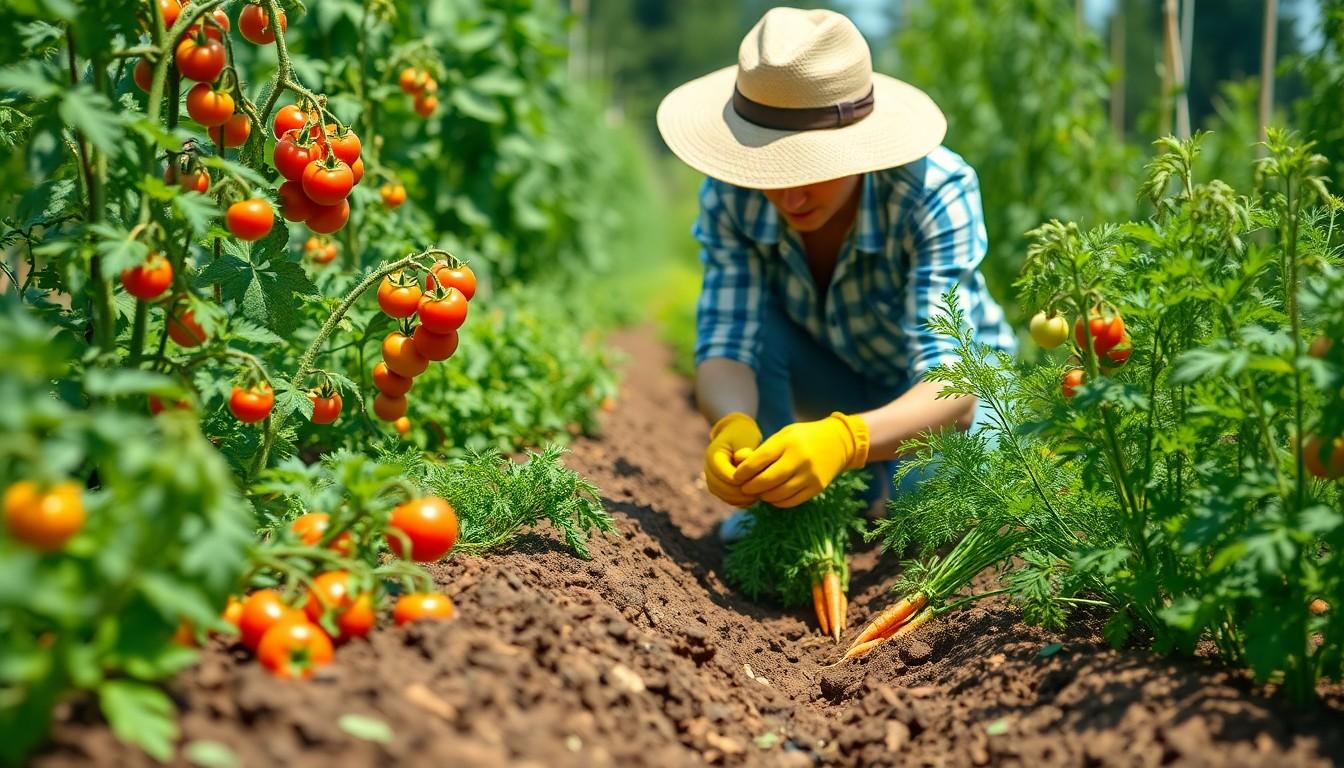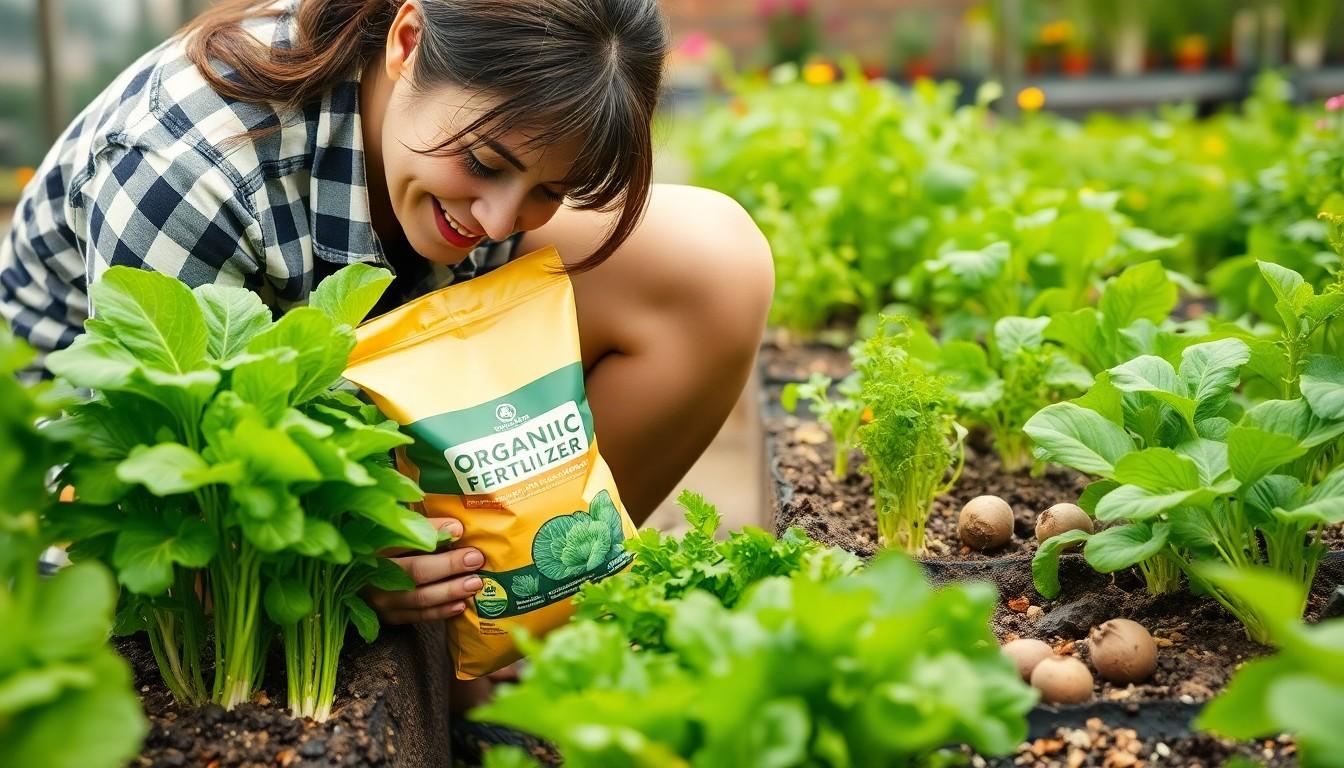Phone:
(701)814-6992
Physical address:
6296 Donnelly Plaza
Ratkeville, Bahamas.

Growing a vegetable garden is like hosting a dinner party for your taste buds, but what’s a feast without the right ingredients? Enter organic fertilizers—the secret sauce that turns your humble plot into a lush, green paradise. Whether it’s tomatoes that taste like sunshine or carrots that could win a beauty contest, the right organic fertilizer can make all the difference.
Organic fertilizers enhance the health and productivity of vegetable gardens. These fertilizers incorporate natural materials that provide essential nutrients.
Organic fertilizers improve soil structure, promoting better water retention and drainage. Nutrient availability increases, resulting in healthier plants. They reduce reliance on synthetic chemicals, which have negative environmental impacts. Organic options promote beneficial microorganisms in the soil, fostering a balanced ecosystem. Using organic fertilizers leads to increased biodiversity, which benefits the overall garden health.
Organic fertilizers release nutrients slowly as they decompose, ensuring a steady supply for plants. Microorganisms break down organic matter, converting it into plant-available forms. The application creates a rich soil environment that enhances root growth. This method of nutrient delivery reduces the risk of leaching and runoff. Organic products improve nutrient uptake efficiency, making gardens resilient to environmental stressors.

Choosing the right organic fertilizer involves multiple factors. Understanding the specific needs of the vegetable garden ensures optimal growth and health.
Evaluating nutrient content is crucial in selecting organic fertilizers. Look for fertilizers that provide a balanced mix of nitrogen, phosphorus, and potassium. Different vegetables require varying nutrient ratios; for instance, leafy greens benefit from higher nitrogen levels, while root vegetables thrive with more phosphorus. Always check the label for nutrient analysis to ensure it meets specific requirements.
Soil type compatibility plays a significant role in the effectiveness of organic fertilizers. Sandy soils often require fertilizers that promote water retention, whereas clay soils benefit from those that enhance drainage. Understanding the garden’s soil composition allows for better targeting of organic fertilizers that optimize nutrient availability and prevent saturation.
Application method affects how well organic fertilizers are utilized by plants. Some fertilizers work best when mixed into the soil, while others act effectively as top dressings. Timing also matters; for example, applying before planting promotes better nutrient absorption during plant growth. Consider these factors to ensure that the fertilizer reaches the plants efficiently and supports healthy development.
Organic fertilizers play a vital role in enhancing vegetable garden productivity and health. Several top choices offer unique benefits for gardeners.
Compost serves as a powerhouse of nutrients. This organic material enriches soil structure while improving moisture retention. Utilizing compost not only introduces essential nutrients, but it also promotes microbial life in the soil. Gardeners achieve a balanced ecosystem through the decomposition of kitchen scraps and yard waste. Incorporating compost into the garden enhances overall plant vigor and resilience. Applying an inch or two of compost around plants during the growing season provides a substantial nutrient boost.
Worm castings rank among the most potent organic fertilizers available. These nutrient-rich pellets provide plants with readily available nitrogen, phosphorus, and potassium. They also enhance soil aeration and drainage, making it easier for roots to access nutrients. Incorporating worm castings improves microbial activity, which ultimately strengthens plant health. Gardeners might mix castings into potting soil or top-dress garden beds for optimal results. A quarter cup per plant is often sufficient to yield impressive growth and fruit production.
Fish emulsion offers an excellent source of organic nutrients for vegetable gardens. This liquid fertilizer contains high levels of nitrogen, making it suitable for leafy greens and vigorous growth. Applying fish emulsion stimulates beneficial microbial activity in the soil. Watering plants with this mixture improves root development while enhancing overall health. Gardeners can dilute the emulsion with water in a ratio of 1:10. Using fish emulsion every four to six weeks during the growing season supports lush, vibrant vegetable production.
Applying organic fertilizers effectively enhances vegetable garden growth. Timing and application methods play a crucial role in achieving optimal results.
Gardeners apply organic fertilizers at key points in the growing season. Early spring serves as a perfect time to prepare the soil, promoting robust root systems. After planting, providing a supplemental feeding every four to six weeks supports continuous growth. Vegetable varieties with high nutrient demands, like tomatoes, benefit from increased frequency, while others may require less. Always consider plant stages; young plants need more support during their initial growth phases.
Various methods exist for applying organic fertilizers, each with unique advantages. Broadcast spreading allows for even distribution across the garden bed. For concentrated feeding, side dressing along plant rows provides targeted nutrients. Liquid solutions, such as fish emulsion, deliver nutrients quickly and can be sprayed directly on foliage. Watering in granulated fertilizers ensures that the nutrients reach the root zone efficiently. Ultimately, choosing the right method depends on the specific fertilizer type and the particular needs of the garden.
Choosing the best organic fertilizer for a vegetable garden is crucial for achieving a bountiful harvest. By understanding the specific needs of the garden and the unique benefits of various organic options, gardeners can enhance soil health and promote vigorous plant growth. Incorporating organic fertilizers not only nourishes the vegetables but also fosters a thriving ecosystem within the soil. With the right application methods and timing, these natural fertilizers can transform any garden into a productive and sustainable source of fresh produce. Embracing organic practices leads to healthier plants and a more enjoyable gardening experience.